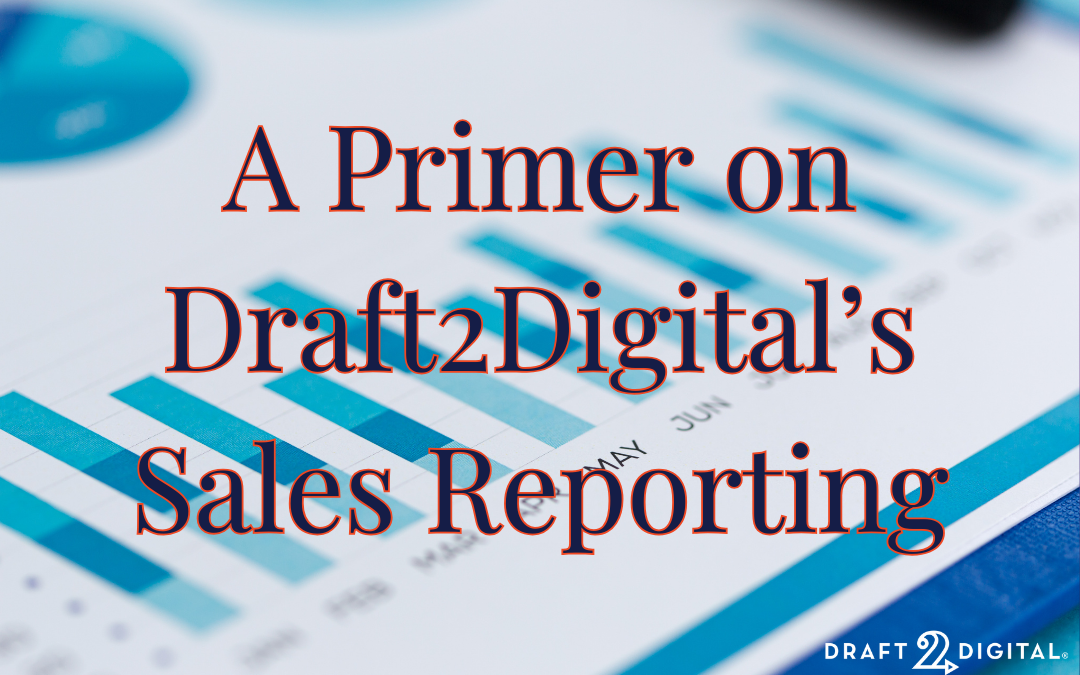One of the advantages of publishing through Draft2Digital is access to sales reporting from numerous platforms in a single dashboard. But the amount of data combined with the flexibility of being able to generate your own custom reports can sometimes be overwhelming.
This primer is meant to help walk you through what D2D’s reporting tools offer and, ways you may be able to use them strategically.
The Dashboard: Your First Stop
When you log into D2D and navigate to My Reports on the Author Dashboard . . .

. . . you’ll find a quick-glance summary designed to answer the questions most authors ask first: How am I doing?
The summary shows you three essential figures:
Total Books Sold
(Broken into: overall, last month, and this month)

If you hover over any of these boxes, you’ll see a brief explanation of what each is tracking. But essentially, these numbers include both sales and free downloads (if applicable based on your book pricing) and are estimated sales based on the daily and weekly sales reports Draft2Digital receives from our various retail, subscription, and library partners.
Total Royalties Accrued
Royalties accrued in the last month and the current month.
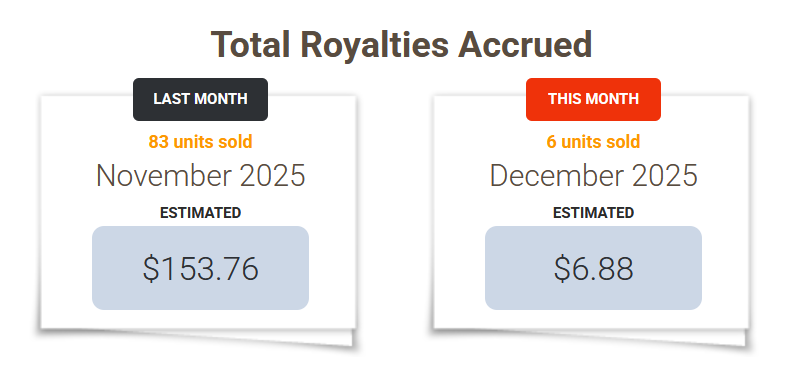
Verified royalties due.
This value indicates money that has been credited to your account and is waiting for payment.
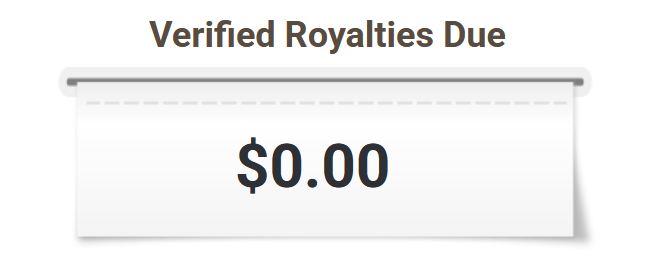
Because Draft2Digital endeavors to get these funds to you almost immediately after the payment comes from the vendor, for much of each month this box will show a $0.00 value. Most of the funds owed to you are usually paid out within a week or two of it being processed from the retailer, library, or subscription platform.
That last distinction matters. Verified versus Estimated.
There’s a difference between estimated royalties based on reported sales and verified royalties that have actually cleared from retailers via their finalized monthly report and payment.
D2D separates these clearly so you know what’s real versus what’s still in the pipeline. Beyond these quick-glance summary metrics, you have numerous options for more specific and even custom detail reporting.
To get to those reports, look over onto the left side of that screen and you’ll see a navigation pane that offers a breakdown of various other insights.
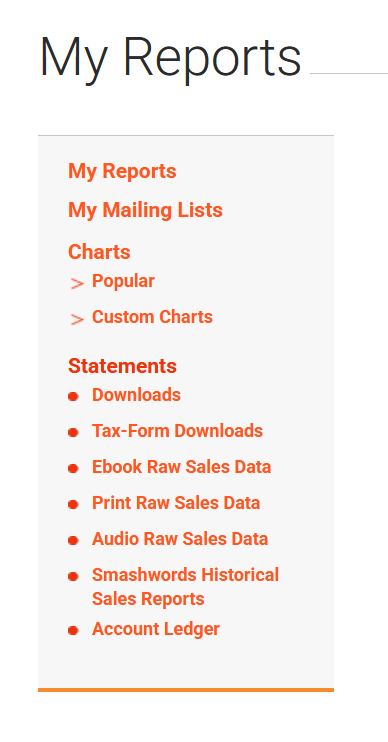
My Mailing Lists tracks the free Books2Read New Release Notification signups that Draft2Digital makes available for you to automatically insert into your ebooks via our automated promotional pages option that appears in the Layout section of ebook setup.
Below you’ll see Charts which is broken down into Popular and Custom Charts. Let’s look at them in order.
Popular is a pre-generated suite of charts that you can click to see a variety of the most commonly desired sales results. They include Sales by Book so far this Month, Sales by Book so far Today, Sales by Contributor so far this Month, Royalties by Sales Channel so far this Year, Royalties by Month so far this Year, Smashwords Sales by Royalties This Month, and Smashwords Sales by Unit This Month.
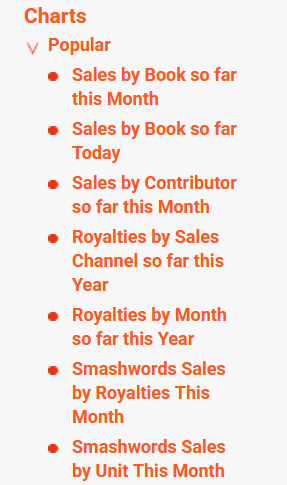
Here is an example of the chart that appears if you click on Sales by Book so far this Month.
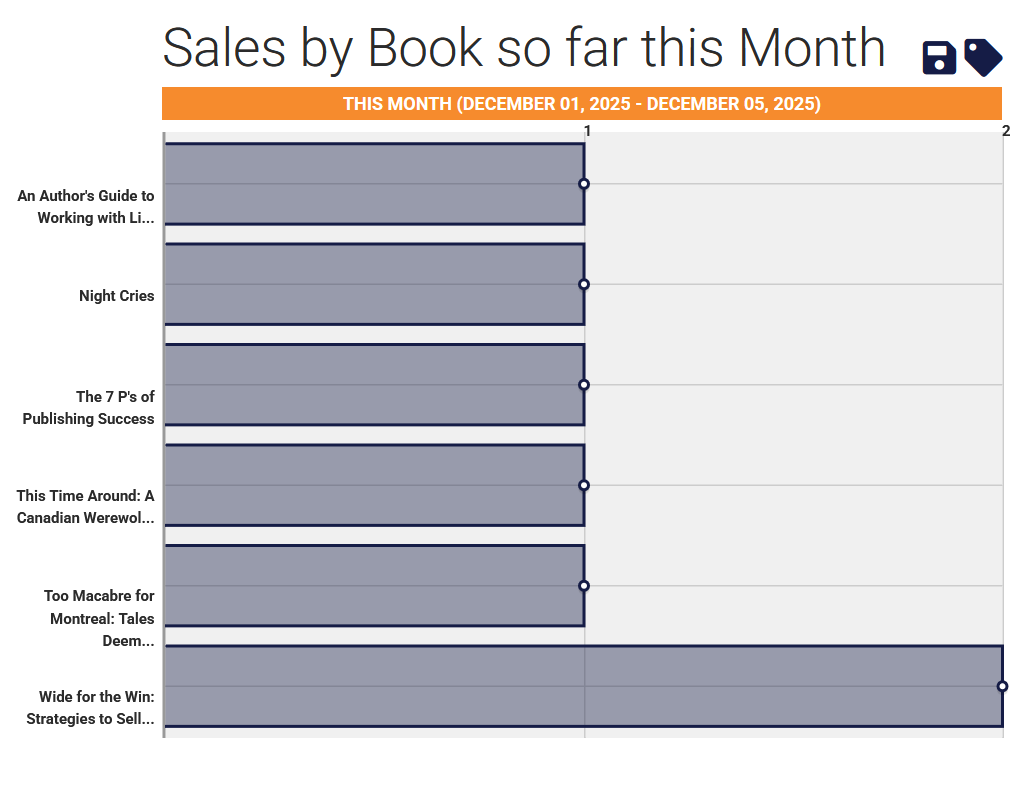
 You might notice that there are two tiny icons that appear in the top right-hand corner of reports.
You might notice that there are two tiny icons that appear in the top right-hand corner of reports.
The icon on the left is the SAVE icon. We’ll return to that in a moment. The icon on the right is the LABEL icon. If you click on it, the chart will display the values (as in the screenshot below, where you might notice that the LABEL icon is highlighted)
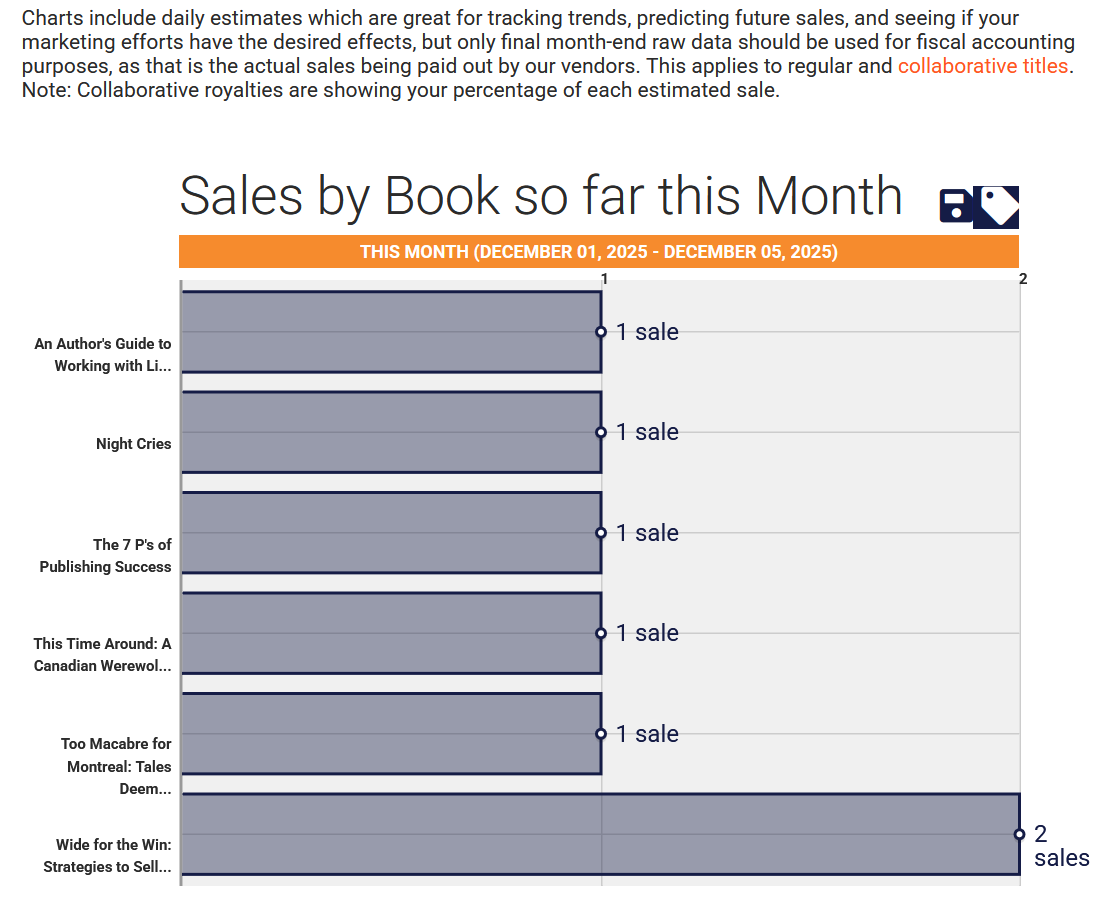
These Popular charts are handy. But here is where your reporting can get extremely powerful, allowing you to generate Custom Charts.
If you look over to the left when displaying a chart (the Sales by Book so far this Month) report, for example, you’ll notice a series of data indicators under two tabs that are named Chart Structure and Chart Contents. Making changes to these values can allow you to modify the data displayed in the chart, and then, once you have a custom report that you like, you can hit the SAVE icon and name that report, and it will show up in an alphabetically sorted list by report name under Custom Charts.
This can be an overwhelming task, so let’s illustrate. Below is the default look at Chart Structure and Chart Contents values for the Sales by Book so far this Month chart.
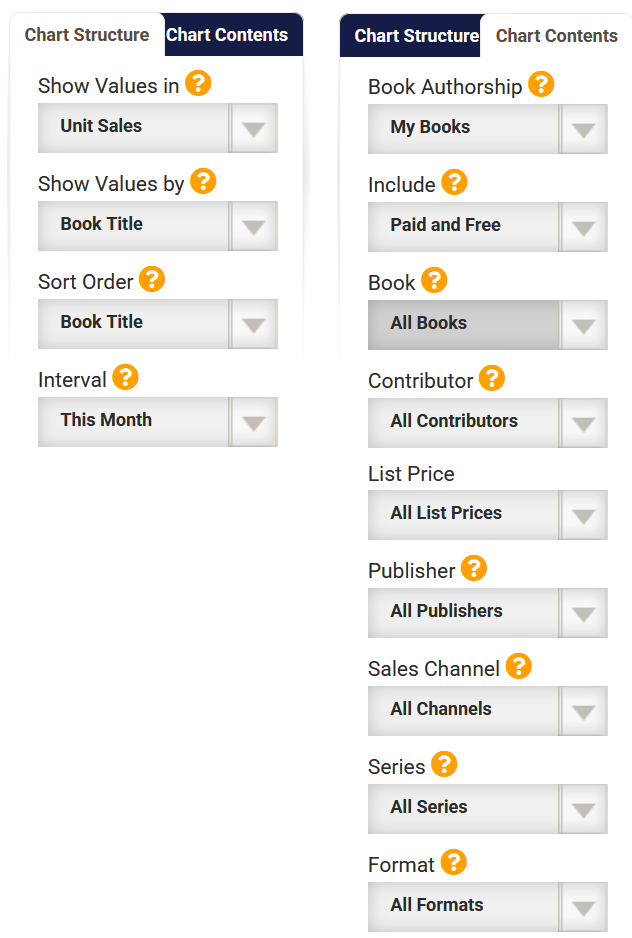
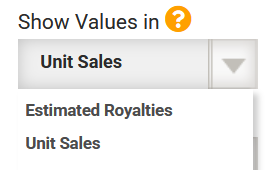 You’ll notice that the first option under Chart Structure is Show Values in and “Unit Sales” is selected. If you click on the drop-down icon on the right, you’ll see there are two options.
You’ll notice that the first option under Chart Structure is Show Values in and “Unit Sales” is selected. If you click on the drop-down icon on the right, you’ll see there are two options.
Those options are “Estimated Royalties” and “Unit Sales.”
If you select “Estimated Royalties” a temporary image of a book with pages turning will appear while the system it is performing calculations and reading data.
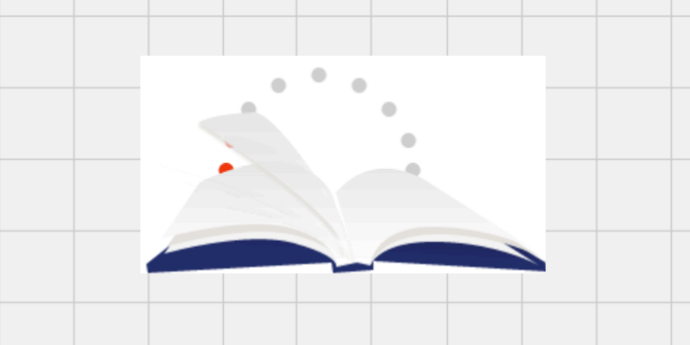
Then you will see that the chart updates to indicate the estimated royalties instead of unit sales.
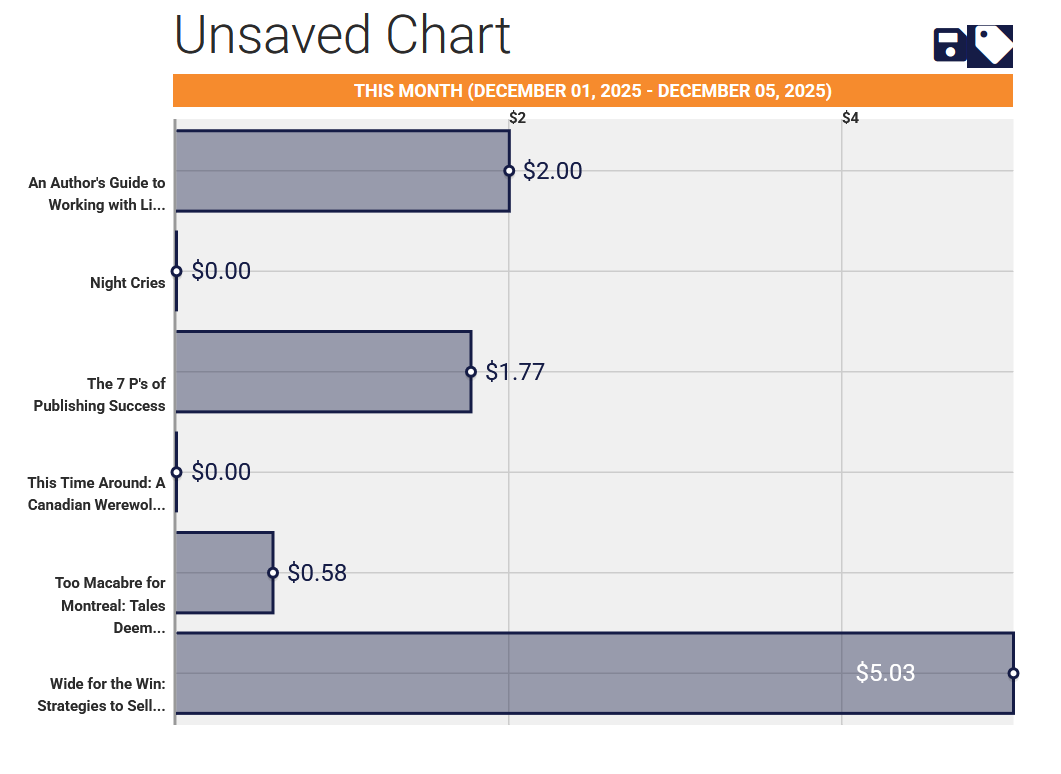
In this example, two of the books are set with a price of $0.00. This means that no matter how many unit sales they have, the estimated royalties will be $0.00. But they still show to indicate any titles that have had free downloads in the specified period.
Notice, also, that the title above the chart updated to “Unsaved Chart.”
If you click on the SAVE icon, you can give the report a name and it will be saved into the Custom Reports section and you can easily running it with the click of a button.

If you go back to the Chart Structure and Chart Contents you’ll find you have access to a significant number of data sets for taking a look at your estimated sales in a variety of ways. This allows you to dig a little deeper and track the information most important to you.
Taking Control and Tracking Insights Important to You
The Charts section is where D2D’s reporting becomes genuinely useful for making decisions. As we’ve seen these aren’t static graphs—they’re configurable tools that let you slice your sales data in multiple ways.
As we’ve seen, you can toggle between viewing net unit sales (how many copies moved) or estimated royalties (how much you earned). This distinction becomes important when you’re evaluating pricing strategies, since a higher-priced book might sell fewer copies but generate more revenue.
The grouping and sorting options let you organize your data by book title, contributor (useful if you write under pen names or collaborate with co-authors), dates, list prices, sales channels, or series.
Each view answers different questions. Grouping by sales channel shows you which retailers are moving your books. Grouping by series reveals whether your first-in-series is doing its job of pulling readers through.
Time intervals range from today and yesterday through the last fourteen days, current month, last month, and full year—plus custom date ranges you define yourself. That last option is essential for evaluating specific promotions or launches.
You can filter by paid versus free downloads, by publisher account if you manage multiple imprints, by list price, by contributor, or by series. Once you’ve configured a chart that gives you the view you need, you can save it for future use rather than rebuilding it each time.
One thing to note about the “Interval” options is when it comes to selecting “Today.” Smashwords is the only store that reports sales data to Draft2Digital in near-real time, so that option is only worthwhile if you’re curious to track how your book is performing live on the Smashwords store. Most of the major retailers send a daily sales estimate of the day before.
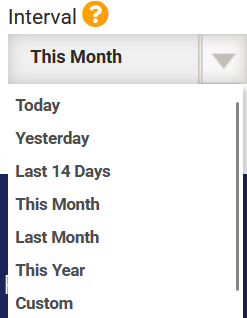
Downloadable “Raw” Sales Data & Royalty Statements
If you want to build your own spreadsheets, track trends over years, or integrate sales data with reports from other sales platforms that you use, Draft2Digital offers downloadable raw data exports. These monthly CSV files detail each transaction: units sold, list price, retailer or distributor, format, and more.
Separate from the raw sales data, D2D provides formal royalty statements once payments have been finalized—after retailers have remitted funds and the money has actually moved. These statements show exactly what was earned and credited.
Draft2Digital also maintains a historical archive, so you can pull data from months or years past. This matters for authors evaluating long-term trends, assessing how a backlist title performs over its lifetime, or preparing financial records.
Here are the seven different options that provide you with the following information:
- Raw sales data export — monthly reports (CSV) that detail each sale/transaction: units sold, list price, retailer/distributor, format, etc. This is useful for authors or publishers who want to build their own spreadsheets or integrate sales data with other tools.
- Royalty/Payment Statements — once royalties are finalized and D2D pays out (after the retailers/distributors remit payments), authors get statements showing exactly what’s been earned and credited.
- Historical data archive — you can access past months/periods to look back over time (for example, tracking growth over years, or evaluating how a series performed over its lifetime) rather than just current-month totals.
This is the breakdown of the seven Statements options.
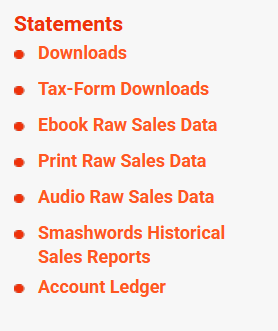
Downloads
Royalty statements are generated in any month where Draft2Digital pays you. You’ll receive separate royalty statements for each Publisher paid that month. Each statement indicates the amount of money you’ve received, the sales channels where those royalties were generated, and the titles that earned the income.
Unlike the data shown on the real-time sales charts, the transactions shown here represent final, official data—the same data that will be used to determine your royalties due. They are generally available sometime mid-month in the month after the sales occurred.
Tax Form Downloads
This is where you can find all of your various tax forms.
1099-MISC
Draft2Digital files 1099-MISC forms with the IRS for earnings paid to US residents and US citizens.
1099-NEC
Draft2Digital files 1099-NEC forms with the IRS for earnings paid for money earned by referrals to US residents and US citizens.
1042-S
Draft2Digital files 1042-S forms with the IRS for earnings paid to non-US citizens living outside of the USA.
EBook/Print/Audiobook Raw Sales Data
This data is something you can download to a CSV (spreadsheet) file.
By default the report shows Date Range, Title, Primary Author, Sales Channel, Net Unit Sales, List Price, Royalty Rate, Unit Cost, User Share USD, and a check-box indicator of whether the data is estimated or final-confirmed.
It includes options of selections for Reporting Period, Sales Channel, Retailer, Sales Model, and Publisher.
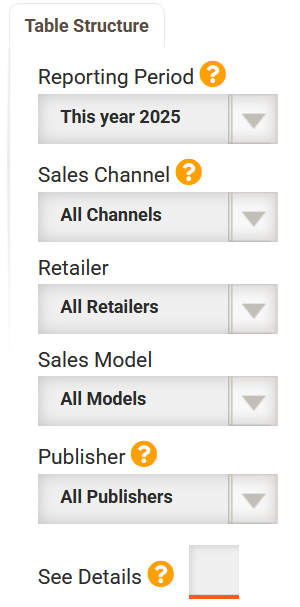
If you click onto the See Details check-box you will get a more detailed look at the data that uses the following fields: Start Date, End Date, Title ID, Title, Primary Author, Sales Channel, Sales Model, Retailer, Publisher, Nation, Net Unit Sales, List Price, Royalty Rate, Unit Cost, Publisher Share USD, and a check-box indicator of whether the data is estimated or final-confirmed.
This raw data + statements option gives full transparency: you can track exactly where, when, and how your books sold, compare across formats or channels, and reconcile earnings precisely.
Using This Data Strategically
The point of all this data isn’t to obsess over daily fluctuations—that way lies madness. Instead, use D2D’s reporting to answer specific questions and make informed decisions.
- Before a promotion: Establish a baseline. What are your typical daily or weekly sales for the title you’re promoting? Without knowing your normal, you can’t measure impact.
- After a promotion: Compare against that baseline. Did sales increase? By how much? More importantly, did they stay elevated after the promotion ended, or did they drop back immediately?
- When evaluating pricing: Look at royalties, not just units. A book at $4.99 that sells ten copies earns more than a book at $0.99 that sells thirty. Price testing requires tracking revenue, not volume alone.
- When assessing channels: If a retailer consistently underperforms, consider whether you’re reaching readers there at all. Sometimes the answer is better metadata or categories; sometimes it’s recognizing where your audience actually shops.
- For annual planning: Use historical data to identify your strongest and weakest months. Plan releases and promotions accordingly rather than guessing.
The Bottom Line
Draft2Digital offers you access to near real-time visibility into how your books are performing, across multiple retailers and formats, with the ability to drill down into the details or step back for the big picture.
The challenge isn’t access to data—it’s developing the discipline to use it thoughtfully rather than reactively.
Check your dashboard regularly, but don’t let daily fluctuations drive your decisions. Use the tools to ask specific questions and evaluate specific strategies. Build a baseline understanding of your normal sales patterns so you can recognize when something changes.
And remember that the goal isn’t to maximize time spent looking at charts—it’s to make better decisions about your writing business so you can get back to the writing itself.
